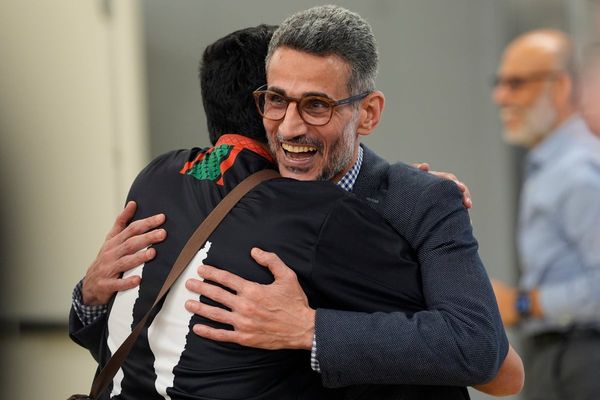Many researchers strive for incremental scientific milestones. Robert Langer, known as the "Edison of medicine," prefers to pursue the loftiest of goals.
What kind of goals? Langer, 74, co-founded pioneering vaccine maker Moderna. He's one of 12 institute professors at Massachusetts Institute of Technology — the school's highest honor awarded to faculty. Plus, he is the most cited engineer in history.
And he sets high expectations for those who work with him in his world-renowned MIT lab, the largest of its type in the world. Langer's lab has spawned dozens of groundbreaking biotech companies. As a chemical engineer, medical researcher and MIT professor, he's the leader in his field. And his students know he's looking for them to work on major breakthroughs.
"At the top of the list of what he taught us is to tackle the big problems," said Marsha Moses, Ph.D., his postdoctoral student in the early 1990s. "He's intellectually fearless and courageous."
Go For Big Goals
Langer's pursuit of breakthroughs has produced a track record that few others can rival.
In 2010 he co-founded Moderna, a biotech firm that rose to fame a decade later with its Covid-19 vaccine. That in itself would be a career-defining achievement for most. Moderna is now a global vaccine giant valued at more than $53 billion.
But that's just a bullet point on Langer's resume. His pioneering research on tissue engineering has driven advances in regenerative medicine. It's a burgeoning area of science where nanoparticles are developed to protect and deliver messenger RNA. These mRNA enable proteins to be produced to help our immune system resist infections.
And well before Moderna developed its Covid vaccine, Langer introduced game-changing drug delivery systems that involve noninvasive penetration through the skin. He also discovered how to control the release of cancer-killing medication directly where the tumor was removed.
Push Others To Do Great Things
With more than 1,400 issued and pending patents worldwide, Langer's inventions are a springboard for today's biotech industry. More than 400 pharmaceutical, chemical, biotech and medical device companies have licensed or sublicensed his patents.
He's also director of MIT's Langer Lab. This lab gave rise to more than 40 biotech firms. It's not a surprise. Langer guides his roughly 150 lab students and postdoctoral fellows to take a multidisciplinary approach to solve big problems. He encourages them to engage in cutting-edge thinking that spans a range of disciplines. That includes engineering, biology, chemistry and materials science.
His leadership style reflects his intellectual curiosity and eagerness to probe for solutions. Even though he has written more than 1,570 articles and is the most cited engineer, he prefers to pose questions rather than dish out answers. He wants students to do the same.
"As a professor, I see people who are judged their whole life by how good their answers are to someone else's questions," he said. "Very few are judged by their questions."
Lead With Questions To Spur Innovation
Langer doesn't tell his researchers what to do. Instead he steps back and lets them tackle vexing problems. But he supports them every step of the way and gives them the freedom to probe while guiding them to excel.
"It's positive reinforcement," he said. "I try to get them to think about what they're doing and ask, 'Have you thought about this or that?' I never tell them that their idea is bad."
If Langer is concerned about a researcher's line of inquiry, he withholds criticism. Instead, he will encourage them to try new things and not give up. His faith in their ability to succeed sends a reassuring message.
"My style is to enable people to do a great job because they believe in what they're doing," he said. "If you're the boss and you show them that you believe in them — and that you want to see them do well — you're better able to lead."
Build A Winning Team
Langer acknowledges that his leadership style works well in part because he's an MIT professor and the school attracts top students. It's easier to step back when you've recruited a team of brilliant minds.
But over his four decades at MIT, he recalls a handful of times that he fired staffers. His lesson: Invest more time in checking references during the hiring process.
Instead of relying on glowing letters of recommendation from past employers, Langer calls them and asks about the job candidate. These phone conversations give him more information to make a wise hiring decision.
Think Big As A Mentor
A native of Albany, N.Y., Langer earned a bachelor's degree from Cornell University in 1970 and a Sc.D. from MIT in 1974, both in chemical engineering.
"When we graduated in 1974, almost all my friends went to work for oil companies," he recalled. "I wanted to help people, so I did my postdoc in a medical surgery lab."
He landed at Harvard Medical School, working for renowned surgeon and research scientist Judah Folkman. As the only engineer on the team during his three-year stint, Langer learned how collaboration across disciplines breeds innovation.
"Judah Folkman's attitude was almost anything was possible," Langer said. "He got me thinking that you can pursue big ideas."
More than 45 years later, Langer carries a lesson from that early experience. Great things happen when you create a culture of convergence in a research lab. He recruits talented teams with expertise in varying areas and spurs them to pool their knowledge and take on problems that stymie others.
Know That Failure Is Part Of Innovation
But Langer doesn't assume simply assembling a smart, diverse group and encouraging them to work together guarantees success. Obstacles arise and many experiments end in disappointment.
"You have to realize that failure is OK," Langer said. "If you want to change the world, you have to be prepared to fail. You put your head down and keep going."
A chocolate lover, he cites the repeated early struggles of Milton Hershey to make and sell candy. Only after a series of defeats did Hershey build a chocolate empire.
Overcoming Early Career Obstacles
After completing his postdoc work with Folkman, Langer applied for faculty positions. But he hit a wall. No chemical engineering department would hire him because he had just spent three years doing medical research in a hospital. It was an unusual career move.
While MIT took a chance on him, he struggled at first. His first nine grants were rejected.
"After a year, my boss — the department head — left and a number of the senior faculty told me to leave too," Langer recalled. "I thought about leaving. But then I decided to take a chance and keep trying."
He kept publishing well-received academic papers. And he learned how to get grants.
On one key grant, he asked two more senior professors to serve as co-principal investigators. That helped him build alliances at MIT.
Moses, now a Harvard Medical School professor, notes how Langer combined "incredible intellectual skills" with a grounded, approachable personality. "He's not ostentatious or arrogant," said Moses, who's also director of the vascular biology program at Boston Children's Hospital. And that's part of his character. "He's humble. He's authentic," Moses said.
Moses is not alone in her appreciation. For Langer's 70th birthday, she helped organize an all-day celebratory event including a symposium, reception and dinner.
"We had to stop the registration at 700 people," she said.
Robert Langer's Keys
- Hailed as the "Edison of medicine," Langer is professor of bioengineering at MIT, head of Langer Lab and co-founder of Moderna.
- Overcame: Early career resistance to his unusual background spanning engineering and medicine.
- Lesson: "My style is to enable people to do a great job because they believe in what they're doing. If you're the boss and you show them that you believe in them — and that you want to see them do well — you're better able to lead."







